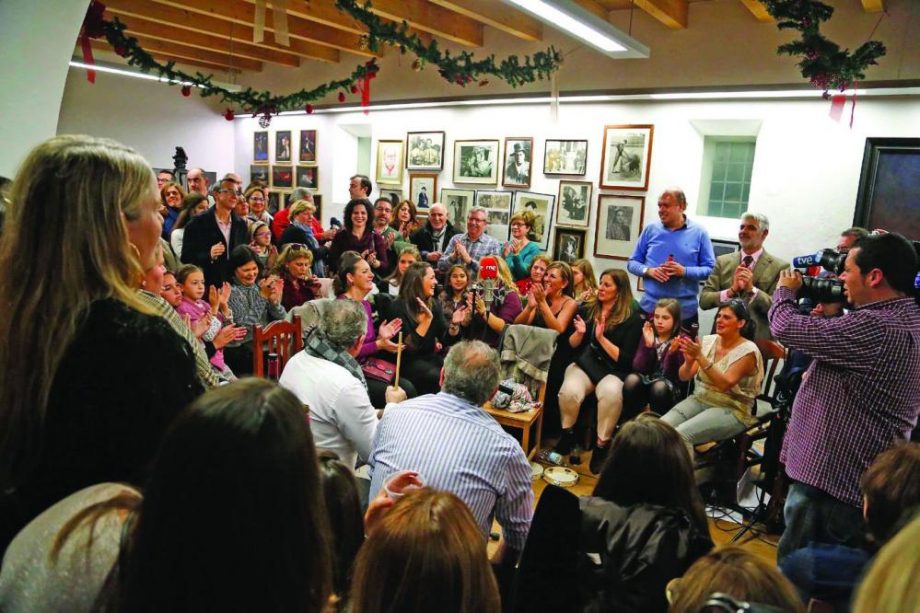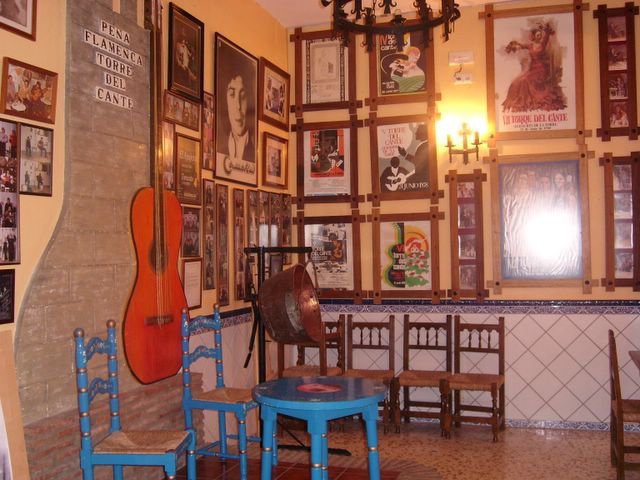In the second half of the 19th societies called Peñas Flamencas started to appear in the Andalusian community. To the naked eye, these places look like a small bars or taverns full of local people. Look a little closer and spot how they have been decorated. Spot the guitar hung on the wall and/or the political propaganda. This is no ordinary bar.
Las Peñas Flamencas play an important role in the survival of flamenco. They organize diverse events: concerts, recitals, open mic nights etc. Aside from supporting flamenco culture, these spaces offer an opportunity for young people to learn their craft and practice playing in front of an audience.
The first place considered a Peña was the Juan Brava Peña in Granada that opened in 1948 and was a space where the locals would come to debate important social issues. The introduction of music was not until later.
There are four main types of Peña Flamenca. The first are the Peñas that were creating to pay homage to flamenco as a cultural symbol. The second type of society considered a Peña is that created by the working class citizens of a town or village and is used not only to celebrate music, but also as a chance to gather together to discuss how to make a positive impact on the local community. The third are the Peñas comprised of the upper middle-class citizens of larger towns and are purely political. The fourth are the Peña Flamencas created in Andalusian villages. These societies are a melting pot of music, politics and social change.
Some peñas are so small there is standing room only. Others are large halls with tables and wooden chairs. They are usually decorated with music memorabilia as well as flamenco trophies one by those who frequent the society.
So, can anyone become a member of a Peña nowadays? That depends on the Peña. From our personal experience at the Guaro Peña, anyone can join although you can eat and drink there without being a member. Members get drink and food discounts for dinner events held there as well as discounts on monthly trips organized by the society. The price of membership is only 5€/month per couple. The prices and benefits will differ from Peña to Peña. Joining a Peña is not only a great way to integrate, improve your language skills and listen to live music, but is also a fantastic way to support local traditions and keep them alive for generations to come.
The Peña Flamencas in the Guadalhorce valley include:
PEÑA FLAMENCA “PEPE DE LA ISLA – CAPITA ”DE COÍN”
Teléfono: 647190649 (Jose Antonio Mancheño)
Dirección: Teniente Coronel de la Rubia 19, Coín, Málaga. CP: 29100
PEÑA FLAMENCA DE ÁLORA
Dirección: Pasaje de Martos, s/n, 29500 (Álora)
Contacto: 652240706 (Manuel Vergara)
PEÑA FLAMENCA “UNIÓN FLAMENCA ALHAURINA”
Dirección: Avda. de La Constitución, 4 , 29120, Alhaurín el Grande
Teléfono: 667073033 (Diego Pérez)
PEÑA FLAMENCA “ALCAZARÍN DE MONDA”
Dirección: C/ Pº de La Villa S/N, 29110, Monda
Teléfono: 617740431 (Miguel González)
PEÑA FLAMENCA “SAN ROQUE DE TOLOX”
Dirección: C/ Chopo, 14 , 29109, Tolóx, Málaga
Teléfono: 649258212-661196964 (Juan Codez Presidente / Miguel García Aguilar)
PEÑA FLAMENCA “TORRE DEL CANTE”
Dirección: Calle Viñas, 11- 29130 Alhaurín de la Torre (Málaga)
Email: [email protected]
PEÑA FLAMENCA “EL ALMENDRO”
Teléfono: 639969315 (Juan Carretero)
Dirección: C/ Granada, nº4, Guaro, Málaga. CP: 29108
PEÑA FLAMENCA “ANTONIO TRUJILLO”
Dirección: C/Barrio Hondillo, 29567 (Alozaina)
Contacto: 686348967 (Juan)
PEÑA FLAMENCA “CIPRIANO PITANA” DE CÁRTAMA
Teléfono: 670 589 244
e-mail: [email protected]
Dirección: Bda. Doña Ana, 12. Cártama (Málaga). CP: 29570
PEÑA FLAMENCA “LA CHURRUCA” DE OJÉN
Dirección: C/ El Arenal S/N , 29610, Ojén, Málaga
Teléfono: 606786153 (Juan Fco. Rubiales)
Go out and find your favourite (and send us a pic!)
Grapevine Properties


